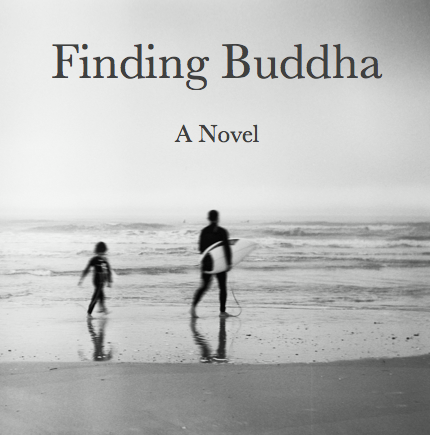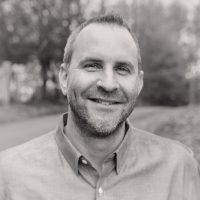
The following is an excerpt from Finding Buddha, a novel by Jay Chalnick.
~
“Who is the Dalai Lama?” Bode asked as we crossed back over the Coronado Bridge.
“The Dalai Lama is the spiritual leader of Tibetan Buddhism,” I said. “He died five years ago.”
“Five years ago? Why is it crazy in China now then?” he asked, surprising me by connecting the turmoil in China to the Dalai Lama’s death.
There had been many occasions in which Bode would ask an intelligent question that presented a common parental dilemma: answer it truthfully or sugarcoat it for little ears? Early on, I decided to be as honest as possible with Bode, no matter how age-inappropriate others may regard the subject matter. I figured that if he was bright enough or mature enough to ask a question, he was entitled to an honest answer. Of course, things would get tricky from time to time when he would ask about things such as his mother and the circumstances surrounding her death. As often as possible, I would answer Bode’s questions as if he were my contemporary, never speaking down to him. He wasn’t shy about asking questions, that’s for sure, and I often found myself looking forward to his next one. Each time I considered sugarcoating an answer, I’d recall how well he had understood the previous explanation. I also considered all the things he wouldn’t have learned if I held back information I thought was too mature for him.
I looked into the rearview and saw that Bode was waiting for an answer. “Well, the article said that Tibet’s high priests haven’t found the Dalai Lama’s reincarnation yet, and China is threatening to appoint their own against the wishes of the Tibetan people.”
“Can they do that?”
“I’m not sure,” I said.
“What does the article say?”
“It says that for the past five hundred years, the Dalai Lama had been selected by Tibetan monks. Buddhist monks, led by a high priest called the Panchen Lama, would search for his reincarnation after his death. It took them four years to find the 14th Dalai Lama.”
Bode still seemed interested, so I continued.
“There’s been tension between China and Tibet for years, increasingly so as the Dalai Lama aged. When he died, it marked the first death of a Dalai Lama since China took control of Tibet. And now, China is threatening to appoint the new one by choosing the name of a high priest from an urn.”
A few seconds passed.
“Dad?”
“Yeah, buddy?”
“How could the next Dalai Lama be a high priest if the last one died five years ago? Shouldn’t it be a kid?”
“That’s a great question,” I said, impressed that he came to such a conclusion. “I guess so.”
A minute passed and then Bode asked, “So, what’s going to happen now?”
“I’m not sure. The article talks about two Panchen Lamas—one appointed by the 14th Dalai Lama and one was appointed by the Chinese government.” I stopped—perhaps abruptly—not feeling up to the task of explaining the apparent abduction of the Panchen Lama who was appointed by the Dalai Lama in 1995. As the article stated, many Tibetans feared that the six-year-old Panchen Lama and his family were kidnapped, and likely assassinated, by Chinese authorities. In any event, no one had seen or heard from the boy since, which was unfortunate considering his destined role to help identify the next Dalai Lama.
Fortunately, Bode steered the conversation back to the Dalai Lama by asking what he did exactly.
“Like I said, he’s the spiritual leader of Tibetan Buddhism. He is believed to be an incarnation of the Buddha of Compassion.”
Crickets.
“You there?”
“Yeah. I’m just thinking. Why does he reincarnate?”
“Well, Buddhists believe that all living beings reincarnate, right?”
“Like Mom and Sophie.”
“Exactly,” I said, looking up to the rearview. “But the Buddha of Compassion chooses to reincarnate, rather than become a Buddha, so he can teach others how to end suffering. He is what’s called a bodhisattva. That’s what the original Buddha called himself before he became enlightened.”
“The Buddha who we read about last night.”
“I thought you fell asleep,” I said.
“No, I was awake.”
I smiled at him in the rearview. “If you want, we can read more about him tonight. Or tomorrow depending on how we feel after setting up camp. It introduces Buddhism a whole lot better than I can. Jorge is into this stuff, too, and he’ll probably know more about what’s going on in China.”
“Okay,” he said and turned to look out the window. “How far ‘til Mexico?”
~
Surrounded by the traffic, noise, and intensity of Tijuana, everything became gray, as if the sun itself was frightened of crossing the border and hid behind the clouds. There was a certain heaviness in the air that made it difficult to breathe. I closed the windows and flipped on the A/C. We crossed a bridge and followed the curve of the road to the left. I glanced in the rearview to see Bode taking it all in, his mouth open in what I assumed was disbelief at all the external stimuli. We were nearly a mile from the border, and I couldn’t help but notice the backlog of bumper-to-bumper traffic in the opposite direction, crawling toward the United States.
Throughout my time at USC, I had been the primary driver for our treks to Baja. Besides being one of only a few of my friends to own a car, I was blessed with an excellent sense of direction. I don’t recall having a GPS back then, yet I always seemed to know which way was north. Often, if we took a buddy’s car, I would drive the leg between San Diego and Ensenada. The directions through the labyrinths of Tijuana and Ensenada seemed etched in my muscles and I could have made the drive blind. The problem was that I wasn’t blind, and many of my visual landmarks often changed: pharmacies would no longer be in business and were replaced with office supply stores or minimarts, rundown buildings would be under construction with scaffolding blocking signs and other landmarks, gas stations became empty lots, even a McDonald’s had moved. The most confusing part was the sheer number of banks, all with similar names: Banco Banorte, Banco Bajanorte, Banco Santander, Banco HSBC, Banco Banamex, Banco Banamer, and so on.
I turned right before the second roundabout at Banco Banorte and took the shortcut to Mexico 1. Though technically it was the main highway, it was several miles before we escaped the congestion of central Tijuana.
“Dad?”
“Hmmm?”
“Was I really born outside?”
“What made you think of that?”
“Nothing,” he said, though I assumed it had something to do with Rodriguez’s question about his mother.
I eyed him in the rearview. “Well yeah, you were. You don’t remember the story?”
He shrugged. “Tell me again.”
“Well, I was in the shower the morning your mom went into labor. I heard her shouting but couldn’t make out the words. When I rushed into the bedroom, I found her sitting on the floor against the wall, smiling with tears in her eyes. ‘He’s coming,’ is all she said. Your mom had her entire pregnancy planned out, and we were scheduled to go to a birthing center in Danbury. I grabbed her bag and helped her to the truck when all of a sudden she stopped and said, ‘We’re not going to make it.’ It was still early morning, and there wasn’t anyone outside. I helped her to the lawn and lowered her to the ground against the maple tree before dialing 911. It was cold outside, real cold, and I’m not sure why she pulled me to the lawn instead of inside. She was breathing fast and hard and kept repeating, ‘He’s coming, he’s coming, he’s coming.’ I relayed everything to the emergency operator who kept telling me to remain calm though I was anything but; your mom was always the calm one.”
I looked up to see if Bode was still listening. He was.
“A policeman arrived in just a few minutes with an ambulance right behind. By the time the EMT got to her, your little head was in my hands. I was so scared, buddy, you have no idea. There was no way to move Mom into the ambulance so they delivered you right on the lawn. Immediately after you were born, they loaded us into the back of the ambulance and took us to the hospital. I held you tight the entire time, wrapped in these tiny little blankets. You were absolutely perfect. Except for those funny eyes, at least.”
“You’re teasing.”
“Yes, I’m teasing. You were perfect. You’re still perfect.”
“What about Mommy?”
“Mom was okay. She was exhausted but otherwise she was fine.”
“She died in the hospital?”
I had told this story to Bode before, but for some reason he thought that his mom died when he was born. A sudden feeling came over me, a memory about some kid whose mother died during childbirth. Did I see it on TV or read an article? The kid grew up obsessed with guilt that he somehow killed his mother during birth. I tried to shake it out of my head.
“No, buddy, of course not. She was fine. In fact, she came home with you a day later.”
I considered sharing the full story then, about how the oncologist ran some tests and concluded that her treatment—which had been delayed for months—would be in vain. How the tumor had penetrated into deeper tissues beyond her cervix. And how the symptoms of pregnancy had masked the symptoms of the tumor spreading to her pelvis, kidneys and beyond. I wanted to tell Bode the whole truth, but I felt the full story might be interpreted just as badly as the notion of her dying as a result of childbirth. At the end of the day, Bode would know the truth: how his mom chose him over her treatment.
“No, she came home with you,” I repeated. “She held you every minute of every day the entire week. On her last day, she handed you to me. She was so happy, Bode. I wish you could have known her. She was certain that she’d fulfilled her life’s purpose, and she told me so before she died.”
“What’d she say?”
“She took my hand and she pulled me close. She said, ‘I knew what I was doing. I did it with purpose. Now it’s up to him.’ And then she went to sleep.”
“Up to me? What’s up to me?”
“I don’t know, buddy.” I had pondered that same question for years and was still no closer to figuring it out. Her words, spoken softly and deliberately just moments before her death sounded more like prophecy than anything else. But where would such a profound statement have come from? Needless to say, I didn’t sleep much those next few weeks. I would lie awake at night in between feedings and hear her voice over and over again: Now it’s up to him.
“All I know,” I continued, “is that your mom was very determined to bring you into this world.”
~
Finding Buddha is Jay Chalnick’s deeply personal debut novel, for which he pulled inspiration from his own challenges dealing with loss and purpose, and the comfort he has found in Buddhist ideals and philosophy.
More information is available at the Finding Buddha website , where Elephant Journal readers can get 25 percent off the signed paperback or signed paperback/eBook combo by using promo code ELEPHANT at checkout.
~






Read 0 comments and reply